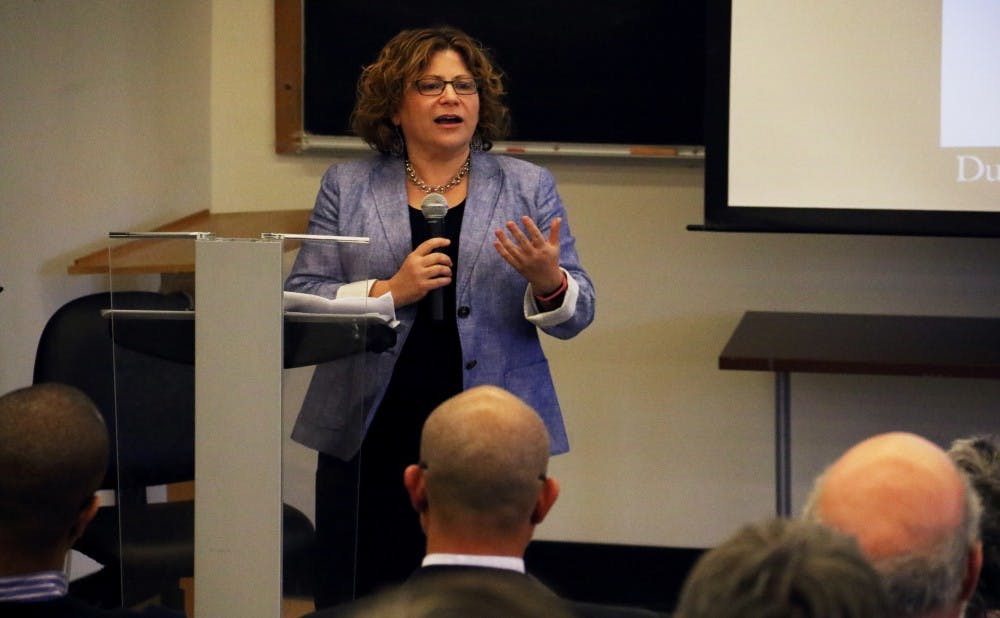The Executive Committee of the Arts and Sciences Council has decided to delay the Council's vote on the proposed new Trinity curriculum until the Fall 2017 semester.
Interim Council Chair Sherryl Broverman, associate professor of the practice of biology, sent the email to faculty in the Trinity College of Arts and Sciences. ECASC and members of the Imagining Duke Curriculum committee came to the decision after meeting to discuss how best to move forward with the proposal, she wrote.
The vote was originally scheduled to take place April 13, the last meeting of the Spring 2017 semester.
In an email to The Chronicle, Broverman noted that the last Arts and Sciences Council meeting provided insight into ways the curriculum proposal could be revised.
"The faculty on the IDC committee would like to incorporate that feedback into another proposal before we move to the amendment and voting process," Broverman noted. "ECASC and the deans are trying to carefully balance moving forward with a new curriculum and moving forward with the right curriculum that excites the most faculty."
The new curriculum proposal—called “The BluePrint”—has received criticism, especially at the Council's March 10 meeting in which representatives of multiple departments said their department had told them to vote against the proposal. Faculty members in multiple departments—including philosophy, statistical science, gender, sexuality and feminist studies, history and sociology—said they would vote against the curriculum in its current iteration.
The most recent version of the proposed Trinity curriculum would restructure the first-year academic experience—called "Frameworks"—and require a course in social sciences, natural sciences and humanities during students' first year.
Concerns from faculty included a lack of information about how the plan would be implemented as well as how the FOCUS program would be used to fulfill the Frameworks requirements. Some felt that using FOCUS classes would allow students to graduate from Duke without actually having taken a class in each of social sciences, natural sciences and humanities.
Frances Hasso, associate professor in Gender, Sexuality and Feminist Studies, expressed concerns that there was never a systematic study of the current curriculum to identify problems that needed to be addressed.
“My sense is that the BluePrint has so many problems that I don’t think it is savable,” Hasso said.
As part of the "Foundations" part of the proposal, students must take at least one writing course, one foreign language course and one quantitative studies course before they declare their major. The initial draft of the curriculum did not require a foreign language course until it was reinstated in this newest proposal—although the new proposal still differs from the current Trinity curriculum which requires up to three foreign language courses.
The current draft would also lower the number of courses needed to graduate to 32, instead of 34, and allow students to declare four credit/no credit courses.
According to Broverman’s email, the Council will reconsider the number of courses required to graduate and whether they should offer credit/no credit courses. These elements will be voted on at the Arts and Sciences Council meeting April 13, and the IDC committee will present a revised proposal in September. A discussion of amendments proposed by faculty will take place in October, with a final vote expected in November.
In a letter to the editor published in The Chronicle that he also shared with faculty members, Thomas Pfau, Alice Mary Baldwin professor of English, wrote that this postponement was likely due to considerable opposition to the proposal.
He added that attempts to "retrofit" the curriculum might end up being more divisive than constructive, and that "political maneuvering" would taint the deliberative process. Even if the proposal were to pass, Pfau suggested it would be on such slim margins that successful implementation would be unlikely.
"I urge the University to thank the current [Imagining Duke Curriculum] committee for its efforts, which I realize were considerable, and then dissolve it," he wrote.
But Alex Rosenberg, R. Taylor Cole professor of philosophy, noted that postponing the vote was appropriate because more discussion on the proposal is needed.
“The time and genius invested in a new curriculum is too great to allow the proposal to die, and the current curriculum is too much of a nightmare to allow it to remain in force any longer than we have to,” he wrote in an email.
Broverman explained at the Council's last meeting that the deliberation and vote on the curriculum was allowed to continue into the next academic year.
“We have the fluidity from the administration to go until the first meeting in the Fall,” she said at that time.
Claire Ballentine contributed reporting.
Editor's note: This article was updated at 1:00 p.m. Thursday to include quotes from Broverman and at 6:00 p.m. Thursday to include quotes from Hasso and Rosenberg.
Get The Chronicle straight to your inbox
Signup for our weekly newsletter. Cancel at any time.

